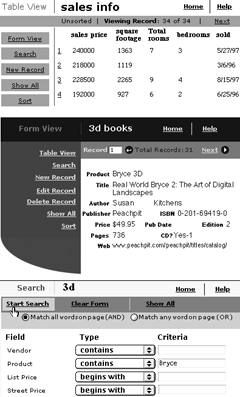|
How It Works
and What You'll Need |
|||
|
FileMaker's Web Companion acts like a Web server by handling the file requests placed by Web browsers visiting your database. It does this by interpreting the HTTP (HyperText Transfer Protocol) commands from the browser, along with operating as a de facto CGI (Common Gateway Interface) application between FileMaker and visiting Web browsers. Web Companion handles all this in the background so you don't have to deal with it. Instead, FileMaker's Web Companion uses its Instant Web Portal and a built-in home page to automatically generate and display links to your Web databases (Figure 18.2). The Web Companion also offers you a variety of page styles for presenting your databases (Figure 18.3). If you elected not to include the Web Companion in your initial FileMaker installation, go back and add it by running the Custom installation. (See page 284 for Windows, page 288 for the Mac.) Besides FileMaker and Web Companion, if you're running the Web Companion on a company intranet, that is all you need. If you're going to publish to the Web, however, you'll also need a full-time Internet connection (dial-up, ISDN, T1, T2, or T3). In theory, you could publish a Web database via a part-time dial-up connection, but no one could use the database unless you were online at the very same time. The IP address for most part-time connections also changes from session to session, which would make it all but impossible for users to keep track of your database's latest location. What if you're just running a small business and don't have the dough to install a Web server, a T1 line, and a closet of cables? Not to worry--many of the same Internet Service Providers who offer dial-up connections can host your FileMaker database on one of their Internet-linked computers for a small monthly fee. FileMaker offers a partial list of such ISPs at: www.filemaker.com/products/isp.html Aside from setting up and configuring the Web Companion, which controls FileMaker's general Web publishing features, you'll need to decide which individual files to share over the Web. As part of preparing those individual files for the Web, you'll probably want to create layouts tailored for your Web users. Not only will that make it easier for your Web viewers, it also prevents the Web Companion from displaying database fields you may not want the world to see. For details, see Sharing and Viewing Web Files on page 270. |
|
||
|
|
|||

